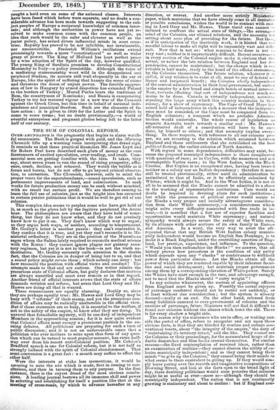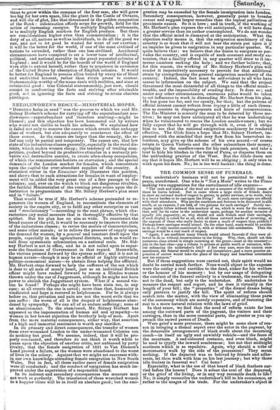THE SUM OF COLONIAL REFORM.
Ovnit-ABUNDANCE is the prognostic that begins to alarm watch- ful economists. The Bank is gorged with gold, and the Morning Chronicle lifts up a warning voice interpreting that dread sign. It reminds us that those practical financiers Mr. Jones Loyd and Sir Robert Peel have described such gluts of money as the sure forerunners of excited speculation, over-trading, and crash. Com- mercial men are getting familiar with the idea. It takes, they say, about seven years to run the round of rising prosperity, afflu- ence, crash, decline, and rebound. They watch the bubble as it forms and bursts, but do not offer to go beyond critical observa- tion, to correction. The Chronicle, however, calls to mind the proper vents for the superabundance,—sound speculation, such as permanent improvements of land, and colonization. In such works for future production money can be sunk without mischief, with no result but certain profit. We are therefore coming to learn the full use of colonies, just as the bright idea has occurred to certain patriot politicians that it would be well to get rid of our colonies.
This complex idea seems to perplex some who have got hold of it, as much as the glove left by the fugitive perplexed the Arctic bear. The philosophers are aware that they have hold of some- thing, but they do not know what, and they do not precisely know how to put it on. They don't know which way to argue; So they argue both ways, or neither, according to temperament. Mr. Godley's letter is another puzzle: they can't contradict it, they confess that it is true, and yet they can't reconcile it to Mi- nisterial orthodoxy. They are-in the position of the Mussulman sages whom the Sultan lately required to reconcile medical science with the Koran : they cannot ignore plague nor gainsay sana- tory regimen, but yet it is not in the book—is not the truth au- thoritative. Mr. Godley earnestly calls attention to the double fact, that the Colonies are in danger of being lost to us, and that a sound policy might retain them ; which nobody can deny : but how reconcile the position with official views and conduct ? The attempts made to that end are curious. One writer admits the precarious state of Colonial affairs, but gaily declares that matters are always unsettled and must ever remain so in that regard. Another friend of official interests avows that the state of affairs demands revision and reform, but avers that Lord Grey and Mr. Hawes are doing all that is wanted. These reassurances are equally alarming. Doubly so, since they are perhaps equally true : Mr. Hawes and Lord Grey may be busy with " reforms" of their stamp, and yet the precarious con- dition of affairs may be radically unalterable in the official view. But if those statesmen are so busy, it is essential to the welfare, if not to the safety of the empire, to know what they are doing. To unravel that formidable mystery, will be one duty of independent Members in the approaching session; for it is now quite evident that Colonial affairs must occupy a prominent position in the en- Suing debates. All politicians are preparing for such a turn of public discussion ; and it is not an unfavourable omen that a politician who ever inclines to seize upon that form of any ques- tion which can be turned to most popular account, has come half- way over from his recent anti-Colonial position. Mr. Cobden's Bradford speech is one for Colonial reform, but it is not half so strongly imbued with the spirit of Coloniafabandonment. That semi-conversion is a great fact : a month may suffice to effect the other half.
Were the interests at stake less Momentous, it would be amusing to note the ado which is made, first in coming to con- di:nth:ins, and then in turning them to any purpose. In the first instance, there is the coyest dread of the most obvious conclu- dons. A leading journal bestows all its immense skill and power In selecting and establishing for itself a position like that at the Meeting of cross-roads, by which to advance hereafter in any direction, or retreat. And another more strictly Ministerta. paper, which maintains that we have already come to all desiral. - or possible conclusions, wishes the world to be content with en" tng in Lord Grey and Mr. Hawes. Those timid eyes cannot induced to confront the actual state of things,—the estranged mind of the Colonies, our vitiated relations, and the necessity ba, setting about some plan of providing for the future. But then, as if in anticipation of the inevitable work, it is hinted that needful labour to make all right will be impossibly vast and diffi- cult. Now that is not so: what remains to be done is not s,. very vast ; neither is it impracticably difficult. Recent occurrenevs in every section of the Colonial empire make it obvious that actual, or rather the late relation between England and her de- pendencies, cannot be maintained ; but the change which is in- evitable is half made, ready to the hand of the official statesman, by the Colonies themselves. The future relation, whatever it is called, if any relation is to exist at all, must be one of federal al- liance and reciprocal benefit ; the Colonies wholly independent of the central administration in their local government, but unite.) to the empire by a few broad and simple bonds of mutual interest. Now, towards effecting that sort of independence not much re- mains to be done. Canada is virtually independent, notwith- standing the large army which this country maintains in the. colony, for a show of supremacy. The Cape of Good Hope has seized hold of independence in such a manner that the indeperm- ence must be conceded, or the Cape must be conquered from its English colonists; a 'conquest which no probable Adminis- tration would undertake. The whole course of legislation as respects Australia tends towards a similar end : Mr. Hawes's oft-retracted draft of a constitution will have to be out- done, by himself or others ; and that necessity implies every- thing. In these respects, with reference to all our colonies pro- per, we are reverting to the relation which subsisted between England and those settlements that she established on the best political footing, the earlier colonies of North America.
With regard to some dependencies, difficulties may exist, be- cause the proposed municipal independence is there complicated with questions of race; as in Ceylon, with the numerous and not contemptible Native races ; in the West Indies, with the Mark Creoles. But Ceylon is an exceptional case, having been treated neither as a colony nor an Indian dependency : therefore it must still be treated provisionally, either until its administration be assimilated to that of India, or it be effectively colonized by Whites; which it might be. And in the West Indies, it is not at all to be assumed that the Blacks cannot be admitted to a sham in the working of representative institutions. Care would no doubt be required in devising plans fbr such institutions ; but while the possession of political power would secure to the Blacks a very proper and socially advantageous considera- tion from their White aristocracy ,—a considerateness which might solve every difficulty connected with free trade in IS- bour,—it is manifest that a fair use of superior faculties and opportunities would maintain White supremacy ; and natural sympathy would always secure the safety of the White race, by its alliance with other sections of its own family in Eurooe and America. In a word, the very way to avert the ott- repeated threat that any British West Indian colony munici- pally independent would become an English San Domingo, is to make it a Black England, under the controlling sanction of Eng- land, her prestige, experience, and influence. To the question, " Would you then enfranchise the Blacks ?" we answer, that all history proves how precarious is the condition of any polity which depends upon any " checks" or contrivances to withhold power from particular classes. Let the Blacks obtain all the power of which they are rendered capable by their inherent facul- ties and social development; but maintain proper government among them by a corresponding elevation of White power. Surely the Whites have start enough in the race, and advantage enough, not to need that the Blacks should " carry weight "?
In any colonies whatsoever, the custom of appointhig officers from England must be given up. Possibly the actual enjoyers of patronage conferred should not be rooted out suddenly, or at least without due consideration ; but the system is already doomed—really at an end. On the other hand, released from many liabilities annexed to over-government of colonies and the exercise of patronage, future Ministers will not find it difficult to found new colonies without the abuses which beset the old. There is for every shadow a bright side. The reason why the statesmen who are in office, or waiting out- side the portal of office, refuse to recognize and act upon these obvious facts, is that they are blinded by routine and certain con- ventional tenets, about "the integrity of the empire," the duty of "maintaining its territory intact," and the like. They cannot see the Colonies or their proceedings, for the accumulated heaps of di- dactic despatches and blue books around themselves. For similar reasons—the fixed contemplation of received ideas, rather than an examination of realities—they cannot discern the utility of co- lonies municipally independent; and as they cannot bring their minds "to give up the Colonies," they cannot bring their minds to what seems to them equivalent to giving up. If they would sim- ply leave poring over the records and imaginative compositions of Downing Street, and look at the facts open to the broad light of day, these doubting politicians would soon perceive that colonies might be as useful as ever—more so—although they should be municipally independent. The nation that is not continually growing is stationary and about to decline : but if England con- tinue to grow-within the compass of the four seas, she will grow too big for her own space, like the giant in the Castle of Otranto, and will die of glut, like that threatened in the golden congestion of the Bank : colonization affords scope for growth, field for the action of increasing energies. To multiply English settlements, is to multiply English markets for English produce. But there are considerations higher even than commercialism : it is the duty of us all, nations as well as individuals, to do all the good we can, and not to let good be wasted for want of our exertion : it will be the better for the world, if one of the most civilized of nations be extended, rather than one less civilized. Accidental circumstances have conspired to set a lower tone of intellectual, political, and national morality in the great separated colonies of England ; and it would be for the benefit of the world if England were able to extend herself, rather than to acquiesce in extension of the United States by absorption of English colonies. It would be better for England to possess allies bound by every tie of blood and undivided interest, rather than rivals prone to contest. Statesmanship worthy of the name deals with realities, and aims at substantial good : true Colonial statesmanship, just now, should consist in confronting the facts and striving after attainable good, not in ignoring the facts and striving to retain obsolete privileges.



























 Previous page
Previous page